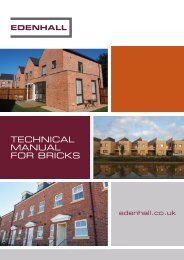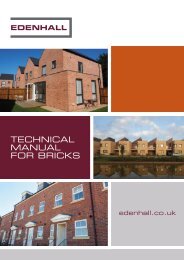Create successful ePaper yourself
Turn your PDF publications into a flip-book with our unique Google optimized e-Paper software.
BRICK TECHNICAL DATA SHEET<br />
ENGINEERING CONCRETE BRICKS<br />
<strong>Edenhall</strong>’s Engineering Concrete Bricks are durable, high strength bricks, specially manufactured to accommodate high loads and cope<br />
with exposure to aggressive ground conditions. Made from selected dense aggregates and a choice of cements, the bricks, which<br />
exhibit low porosity and high dimensional accuracy, are completely frost resistant and suitable for use below ground where natural<br />
sulphates, up to and exceeding Class 3 levels, are present. Two grades of bricks in two forms are available:<br />
(a) Red Semi Engineering Brick [RSE] made with Ordinary Portland Cement. Available in both Solid and Frogged forms.<br />
(b) Sulphate Resisting Engineering Quality Brick [EQ] made with Sulphate Resisting Cements. Available in Solid form only.<br />
Engineering Bricks are manufactured and tested in accordance with BS EN 771-3: 2011; Specification for Masonry Units: Aggregate<br />
Concrete Masonry Units and meet the criteria for strength, durability and sulphate resistance as detailed in BS 5628 Pt 3: 2005 and PD<br />
6697 and other Standards.<br />
Application<br />
Appearance<br />
Dimensions<br />
Configuration<br />
Composition<br />
Can be used: below d.p.c; for inspection chambers; manholes; catch pits containing surface water or foul<br />
drainage and for earth retaining walls<br />
Red [RSE]/ Tawny [EQ]colour – close texture. Colour consistency not guaranteed.<br />
215mm x 100mm x 65mm Tolerances Category D1 (+3-5mm in all directions)<br />
Solid (no frogs/perforations)<br />
Dense aggregate and Portland OR Sulphate Resisting blended cements, with a minimum cement content<br />
of 360kg/m 3 . Both types of engineering bricks have been surface carbonated in accordance with BRE<br />
Special Digest 1:2005, Concrete in Aggressive Ground Conditions: Part F5.<br />
Dry Density Average 2200kg/m 3<br />
Dry Weight<br />
Compressive Strength<br />
3.1kg - 3.3kg approximately<br />
>50N/mm 2 mean. Air dry.<br />
Note: Under the standards BS EN 771-1: Clay Bricks and BS EN 771-3: Concrete Masonry Units the test method for measuring compressive<br />
strength has been amended. This results in higher strengths being achieved but with no inherent alteration in the fundamental properties of the<br />
product. Engineering Concrete Bricks harden with age and a standard 50N/mm2 brick will perform in a similar manner as regards durability to a<br />
Clay Class B.<br />
Thermal Conductivity 1.24 W/mK (Dry): 1.24 W/mK (@ 3%); 1.33 W/mK (@ 5%)<br />
Durability<br />
Water Absorption<br />
by Capillarit<br />
Moisture Movement<br />
Engineering Concrete bricks comply in all respects to the standards required by BS 5628: 2005, the<br />
NHBC, the Highways Agency, the Water Research Council and the Department of Transport. They are<br />
suitable for use in sulphate soil conditions up to and including DS-1, DS-2 and DS-3.<br />
The EQ brick may be suitable up to DS-4 conditions subject to satisfying the other criteria laid down in the<br />
relevant BRE Special Digest.<br />
Neither Engineering Brick is suitable for use as an actual damp proof course.<br />
Neither Engineering Brick, nor the mortar, is resistant where high levels of acid are present and degradation<br />
will occur to varying degrees dependant on the pH levels as shown below:<br />
*pH 6.5-5.5 - slight degradation *pH 5.5-4.5 - severe degradation *pH < 4.5 - very severe degradation<br />







